Textiles & Garments
LESOTHO
Increase your profits by investing in higher value textiles and garments in Lesotho, exploiting its tariff-free access to major markets.
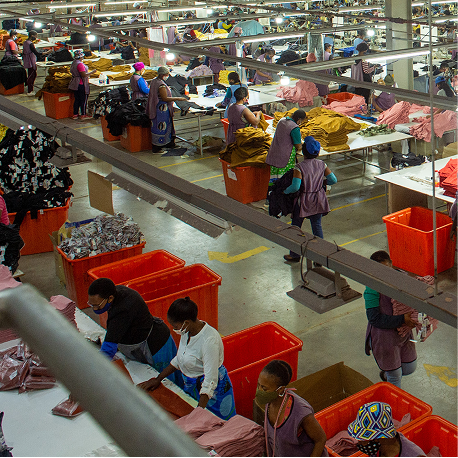
Introduction
Lesotho is an established player in the global textiles and garments industry.
This project aims to build on that success and attract investment in higher-value added products that can be exported to the USA, EU and other major markets, taking advantage of Lesotho’s preferential trade access. An experienced and competitive labour force is another key strength.
The proposed locations of the project are the established Tikoe Estate in Maseru and Belo Estate in Butha Buthe, which is under development.
Convenient
export to neighboring
markets in the
SADC region.
Strengths &
Opportunities
Lesotho’s African rivals are Kenya, Mauritius and Swaziland. Most of Lesotho’s textiles and garments are exported to the USA under African Growth and Opportunity Act (AGOA) and to South Africa.
IN 2017, SOUTH AFRICA WAS LESOTHO’S LARGEST EXPORT MARKET, accounting for
39%
OF TOTAL EXPORTS
TARIFF FREE ACCESS TO US MARKET
Lesotho enjoys tariff free access to the US market for 6,400 products under the AGOA. In practice it only exports a small fraction of these product lines. Many of these unexploited product lines fall within the textiles and garments sector.
PREFERENTIAL MARKET ACCESS TO EU
As a Less Developed Country, Lesotho benefits from preferential market access to the EU under the EU/SACU EPA; EFTA; MERCOSUR; and with a wide range of countries under the Generalised System of Preferences (GSP), including China.
Lesotho also can utilise inputs from other countries benefiting from China’s LDC preferential scheme.
In addition, Lesotho has tariff and quota free access to the SACU market. Lesotho has free currency convertibility as a member of the SACU Common Monetary Area. Lesotho exporters to the SACU market are not affected by currency exchange fluctuations. Lesotho also has tariff and quota free market access to the SADC free trade area.
These agreements give Lesotho an important comparative advantage in relation to more developed exporters.
Lesotho’s access to both regional and North American markets is well established in terms of logistics. Access to the port of Durban for Lesotho made products is straightforward and Lesotho shipments to the US ports compete favourably with those from South East Asia. Shipments from Lesotho take from 18 to 23 days to reach a US port.
Belo Industrial Park, Butha Buthe.
Financial Analysis
TOTAL INVESTMENT
A total investment of approximately:
LSL* 7m
comprising fixed assets of LSL 6m, pre-production expenditure of LSL 200k and initial working capital of LSL 800k will be required for the establishment of the Textiles and Garments manufacturing enterprise. The graphs below illustrate a financially viable operation with the opportunity expected to generate a profit throughout its operational life.
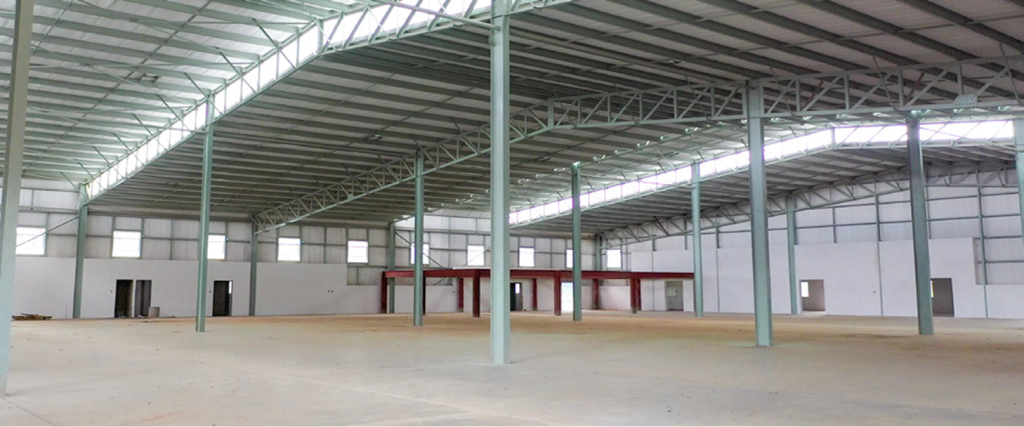
In addition to the positive NPV and IRR, the initial investment cost of the project is expected to be fully recovered in the beginning of the fourth year. The investment opportunity further responds favourably to the Country`s developmental objectives through its positive socio-economic impact in terms of employment creation, economic agglomeration and potential forex earning opportunities.
The enterprise’s annual net profit after tax increases from
LSL 3.8m
LSL 62m
in year 10. Similarly, the projected cash flows of the envisaged project indicate that it will generate positive net cash flows throughout the 10-year operational period.
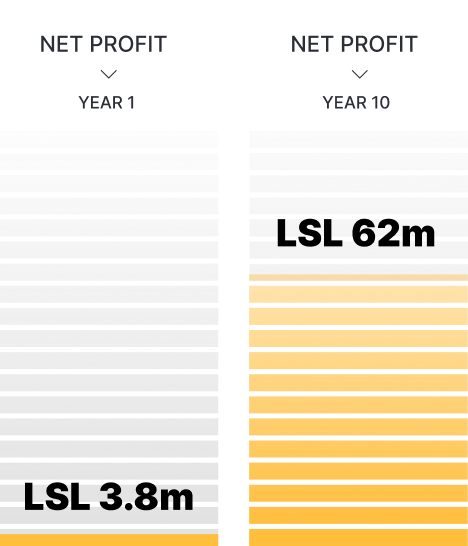
Financial Analysis
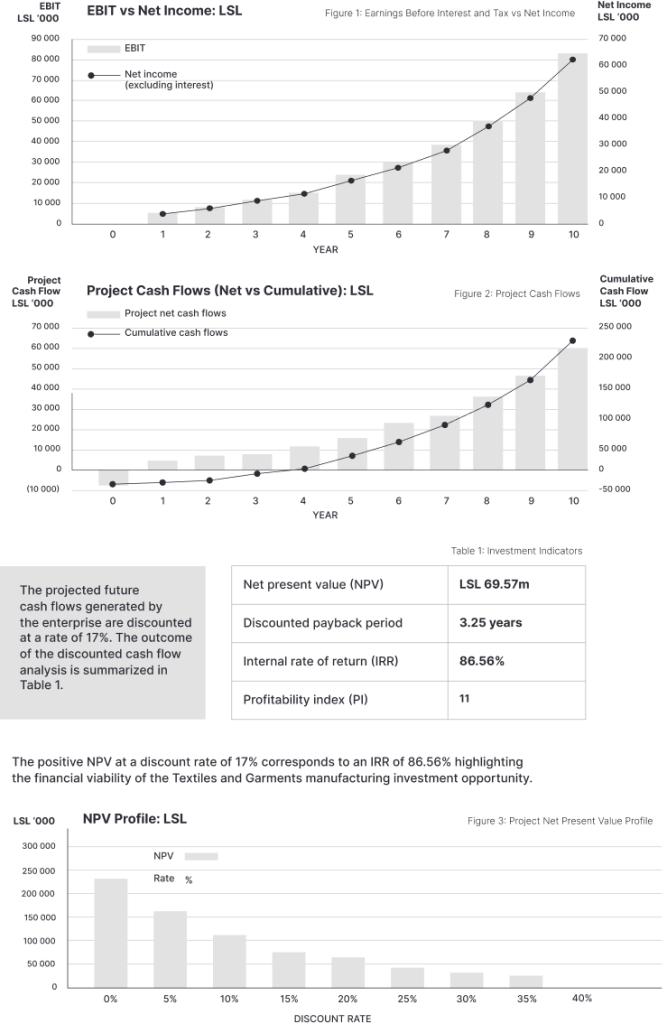
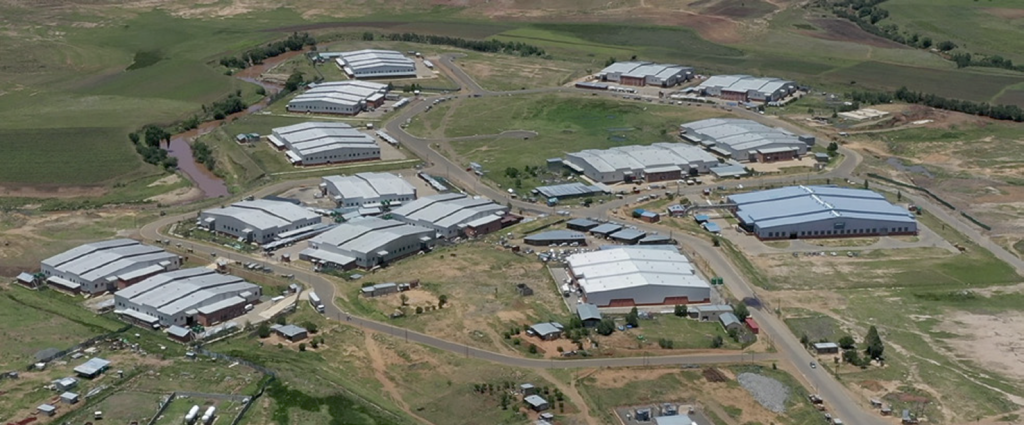
Tikoe Industrial Park, Maseru.

Belo Industrial Park, Butha Buthe.
The financial analysis of the Textiles and Garments investment opportunity is computed over a ten-year period. Revenue and expenditure projections are in line with industry growth prospects and market potential and have been informed by and benchmarked against industry standards and norms. In addition, assumptions relating to inflation: depreciation and salvage value: and company tax have been worked out based on the existing laws and directives of the country. The figures above represent high level estimates as of January 2021 and are not derived from a full feasibility study. Investors are advised to conduct their own due diligence. The project assumes that the investor will have a viable business case that is driven by international client demand.
For more information please contact:
MS. PHOMOTSO MAJODINA
General Manager (a.i)
Investment and Trade Promotion Unit
Lesotho National Development Corporation
Email: [email protected]
MS. MABATAUNG TSINYANE
Manager: Investment Promotion, Manufacturing
Lesotho National Development Corporation
Email: [email protected]
MS. MAKOPANO MOSAKENG
Officer: Investment Promotion, Manufacturing
Lesotho National Development Corporation
Email: [email protected]
MR. TSEPISO MOFOLO
Officer: Investment Promotion, Manufacturing
Lesotho National Development Corporation
Email: [email protected]
